
Today, the Bank of Japan (BOJ) voted unanimously (9-0) to maintain its policy rate at -0.1% and keep its 10-year JGB yield target at about 0%. The BOJ offered no guidance on whether it might scrap negative rates next year, which knocked the yen (^USDJPY) down more than -1%. In addition, post-meeting comments today from BOJ Governor Ueda offered no clear timeline for when the BOJ will normalize its monetary policy.
BOJ Governor Ueda is keeping the markets guessing as to when the BOJ may begin policy normalization. At today’s press conference, Ueda didn’t rule out policy normalization at any of the upcoming BOJ meetings while insisting he first needs to see more evidence that the BOJ will achieve its price stability target. Ueda didn’t clearly rule out any action at next month’s BOJ meeting but said, “There isn’t much likelihood of us suddenly announcing that we’ll raise rates a month in advance.”
Japan’s central bank has been an outlier, having failed to even start tightening monetary policy, while other global central banks appear set to wind down their rate-hike cycles. Despite today’s ambiguous outcome to today’s BOJ meeting, speculation is still mounting that a rate hike will come in 2024. Inflation in Japan continues to outpace the BOJ’s price target, and anecdotal evidence suggests that wage hikes for next year are likely to be larger than this year, a result that would support the BOJ’s goal of achieving sustainable price growth.
Swaps traders have priced in an 85% chance of a BOJ rate hike by the April 26 meeting, compared to a 45% chance at the January 23 meeting or a 53% chance for a rate hike at the March 19 meeting. BOJ Governor Ueda said today that the side effects of negative rates aren't decisive enough to require an immediate policy adjustment, and the chances are low that the BOJ will announce a rate hike next month. Hideo Kumano, a former BOJ official and executive economist at Dai-Ichi Life Research Institute, said Ueda’s comments point to April as a more likely time for a rate liftoff than January.
Some economists are concerned that the likelihood of the Federal Reserve pivoting toward rate cuts next year may limit the window for the BOJ to raise interest rates for the first time since 2007. If an end to the BOJ’s subzero rate were to trigger a much stronger yen, it could rekindle deflationary pressure in the economy. BOJ Governo Ueda said today that the BOJ wouldn’t rush its policy decisions based on what the Fed might do in three or six months' time. However, former BOJ official Kumano said, “If the Fed cuts rates, for instance, after the BOJ’s April meeting, foreign exchange rates would end up getting a double punch that would prompt the yen to gain. That’s something the BOJ wants to avoid.”
On the date of publication, Rich Asplund did not have (either directly or indirectly) positions in any of the securities mentioned in this article. All information and data in this article is solely for informational purposes. For more information please view the Barchart Disclosure Policy here.






